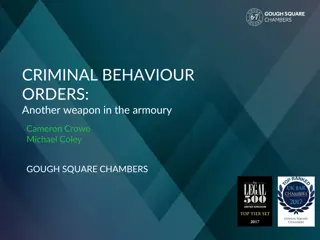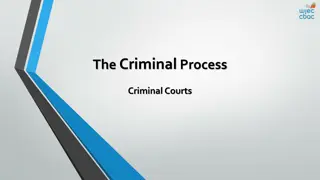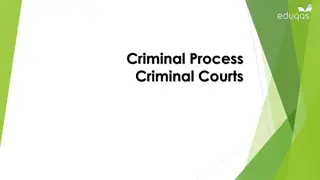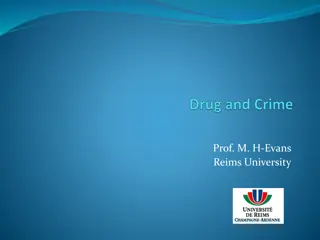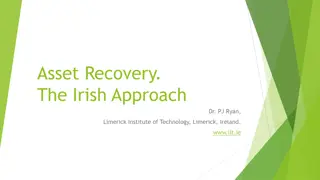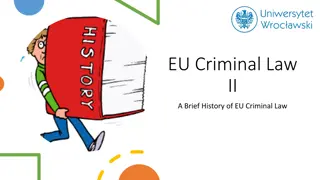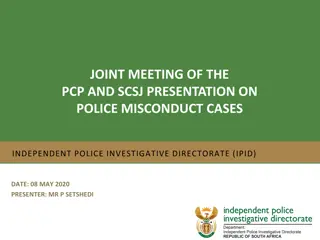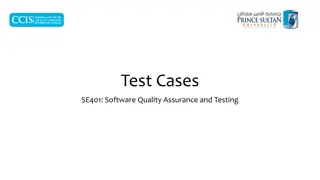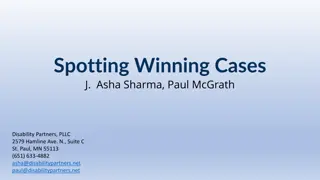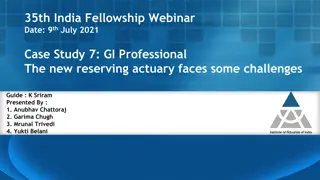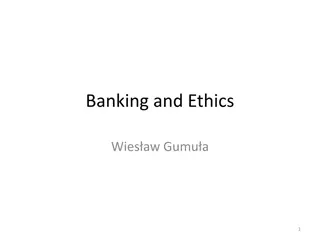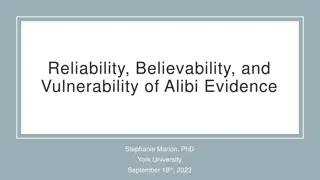Ethical Practices in Appointed Criminal Cases
Presentation by William R. Bill Cox, First Assistant at El Paso County Public Defender's Office, covering ethics in criminal cases, controlling laws in Texas, top practice areas for grievances, common complaints, client communication protocols, duties upon appointment in a criminal case, and client confidentiality rules.
Download Presentation

Please find below an Image/Link to download the presentation.
The content on the website is provided AS IS for your information and personal use only. It may not be sold, licensed, or shared on other websites without obtaining consent from the author. Download presentation by click this link. If you encounter any issues during the download, it is possible that the publisher has removed the file from their server.
E N D
Presentation Transcript
Ethics and Appointed Criminal Cases Presented by: William R. Bill Cox First Assistant El Paso County Public Defender s Office
Controlling Law In Texas Disciplinary Rules of Professional Conduct Code of Criminal Procedure Family Code Caselaw
Top Practice Areas for Grievances Criminal Law Non-client Relationship Family Civil PI Immigration
Top Complaints In Grievances Communication Neglect Integrity Declining or Terminating Representation Safeguarding Property
Client Communication 1.03 Communication (a) A lawyer shall keep a client reasonably informed about the status of a matter and promptly comply with reasonable requests for information. (b) A lawyer shall explain a matter to the extent reasonably necessary to permit the client to make informed decisions regarding the representation.
Good afternoon Ms./Mr. Lawyer, my son is at the Jail Annex, and hasn t heard from his lawyer. What is going on with his case? How do you respond?
Duty on Receiving Appointment in a Criminal Case Contacting the client Appointed counsel shall: make every reasonable effort to contact client by the end of the first working day after receiving appointment Interview the client as soon as practicable after receiving the appointment Tx. Code Crim. Proc. 26.04(j)(1)
Client Confidentiality Privileged Information Information learned directly from the client Confidential Information Information learned during the scope representing a client, but not learned directly from the client.
Client Confidentiality Rule 1.05 Confidentiality of Information With the exception of the permissible or mandatory disclosures of the rules a lawyer shall not knowingly reveal confidential information of a client or a former client to: (i) a person that the client has instructed is not to receive the information; or (ii) anyone else, other than the client, the client s representatives, or the members, associates, or employees of the lawyer s law firm.
Client Confidentiality May Disclose A lawyer may reveal confidential information: (1) When the lawyer has been expressly authorized to do so in order to carry out the representation. (2) When the client consents after consultation. (3) To the client, the client s representatives, or the members, associates, and employees of the lawyers firm, except when otherwise instructed by the client. (4) When the lawyer has reason to believe it is necessary to do so in order to comply with a court order, a Texas Disciplinary Rule of Professional Conduct, or other law. (5) To the extent reasonably necessary to enforce a claim or establish a defense on behalf of the lawyer in a controversy between the lawyer and the client. (6) To establish a defense to a criminal charge, civil claim or disciplinary complaint against the lawyer or the lawyer s associates based upon conduct involving the client or the representation of the client. (7) When the lawyer has reason to believe it is necessary to do so in order to prevent the client from committing a criminal or fraudulent act. (8) To the extent revelation reasonably appears necessary to rectify the consequences of a client s criminal or fraudulent act in the commission of which the lawyer s services had been used.
Client Confidentiality May Disclose (d) A lawyer also may reveal unprivileged client information. (1) When impliedly authorized to do so in order to carry out the representation. (2) When the lawyer has reason to believe it is necessary to do so in order to: (i) carry out the representation effectively; (ii) defend the lawyer or the lawyer s employees or associates against a claim of wrongful conduct; (iii) respond to allegations in any proceeding concerning the lawyers representation of the client; or (iv) prove the services rendered to a client, or the reasonable value thereof, or both, in an action against another person or organization responsible for the payment of the fee for services rendered to the client.
Client Confidentiality Must Disclose (e) When a lawyer has confidential information clearly establishing that a client is likely to commit a criminal or fraudulent act that is likely to result in death or substantial bodily harm to a person, the lawyer shall reveal confidential information to the extent revelation reasonably appears necessary to prevent the client from committing the criminal or fraudulent act. (f) A lawyer shall reveal confidential information when required to do so by Rule 3.03(a)(2), 3.03(b), or by Rule 4.01(b).
Initial Meeting Discussion of Attorney Client Privilege Limits on AC Privilege Duty to disclose Intent to commit perjury to perpetrate fraud on Court Intent to Commit in the future Criminal behavior involving children Tex. Family Code 261.101 Note this specifically trumps attorney client privilege Tex. Family Code 261.101(c) Failure to report Class A Misdemeanor, unless Victim of abuse was child with ID at State Center, then state jail State proves intent to conceal abuse or neglect Tex. Family Code 261.109
Initial Meeting Do you want me to talk to anyone? If so what kind of information do you want me to give them? Does the client expressly request you not give any information to some people
Client: I didnt do this. I was with my friend Juan, but I don t want him involved, and I forbid you to talk to him. I also had a really bad childhood, my father beat me, and my older brother molested me, but you can t talk to my family or anyone else about that. Everything I tell you is confidential right? So ..?
Investigation Duty to Investigate Counsel Ineffective for: Relying on DA s version of the facts Ex parte Raborn, 658 S.W.2d 602 (Tex.Crim.App. 1983); Ex Parte Butler, 716 S.W.2d 48 (Tex.Crim.App. 1986); Ex parte Welborn, 785 S.W.2d 391 (Tex.Crim.App. 1990); Diaz v. State, 905 S.W.2d 302 (Tex. App.-Corpus Christi, 1995 ); Melton v. State, 987 S.W.2d 72 (Tex. App. Dallas 1998, no writ). Relying on client s version of the facts Ex Parte Duffy, 607 S.W.2d 507 (Tex. Crim. App. 1980), overruled by Hernandez v. State, 988 S.W.2d 770 (Tex. Crim.App. 1999) on other grounds. Duty to perform an independent investigation Ex parte Brandley, 781 S.W.2d 886 (Tex. Crim.App. 1989, Rehrg. Denied 1990), overruled as stated in Baldwin v. State, 2009 Tex. App. LEXIS 4270 (Tex. App. Austin June 12, 2009) on other grounds.
Investigate What??? State s Case Allegations/Theory Witnesses Credibility Criminal History Prior false allegations Experts Daubert/702 issues Prior testimony Enhancement(s) Priors Extraneous Offenses
Investigate What??? Client Case Client s story Medical testimony to support client s story/defense Rylanderv. State, 75 S.W.3d 119 (Tex. App.-San Antonio, 2002, pet granted), reversed Rylanderv. State, 101 S.W.3d 107, (Tex. Crim.App. 2003) because record incomplete to support finding of ineffective assitance. Alibi witnesses Bryant v. Scott, 28 F.3d 1411, (5thCir. 1994). Investigating Alibi Witnesses Ex parte Hill, 863 S.W.2d 488 (Tex. Crim. App. 1993). Mental health Woods. v. State, 59 S.W. 3d 833 (Tex. App Texarkana, 2001, pet granted), reversed by Woods v. State,108 S.W.3d 314 (Tex. Crim. App. 2003) for lack of jurisdiction to consider ineffective claim/error preservation issue. Competency Ex parte LaHood, 401 S.W.3d 45 (Tex. Crim.App. 2012). In this case counsel was not found to be ineffective because second prong of Strickland was not met.
Investigate What??? Mitigation Rompilla v. Beard, 545 U.S. 374 (2005), Wiggins v. Smith, 539 U.S. 510 (2003). Client s education records Mental Health Developmental History Abuse/Neglect Substance use and abuse Life Experiences Family Dynamics
19 year old Client: Dont worry about that [immigration stuff]. I ve lived in El Paso all my life. I just want to get this case over with.
Plea Bargains Duty to convey plea offers Missouri v. Frye, (132 S.Ct. 1789, 2012). Ex parte Lemke, 13 S.W. 3d 791 (Tex. Crim. App. 2000) Duty to advise client about plea offers, advisability of accepting or rejecting, etc. Lafler v. Cooper, (132 S.Ct. 1376, 2012). Melton v. State, 987 S.W.2d 72 (Tex. App. Dallas 1998, no writ). Check case, mistakenly? Telling client video tape of robbery in evidence causing plea Remember duty to serve as an advisor to clients 2.01 Tex. Disciplinary Rules Professional Conduct
Collateral Consequences Immigration Padilla v. Kentucky, (559 U.S. 356, 2009). Issues in a border community.
Collateral Consequences (Immigration is just the beginning ) Employment College Admission Educational Loans Firearm Possession Enhancement Sex Offender Registration Government Assistance Housing, Medicaid, TANF, etc. National Inventory of Collateral Consequences of Conviction http://www.abacollateralconsequences.org/
Lawyer: Mr. Client, I know you want to testify, but I will not call you to testify at trial, when the jury hears that you held up that woman at gun point last year, they will convict you for sure.
Clients Decisions Plead Guilty/ Not Guilty (Accept a plea bargain) Judge or Jury at Trial Judge or Jury at Punishment Whether to Testify Whether to Appeal ABA Standards for Criminal Justice 4-5.2
Not Clients Decisions AKA Ethical Quicksand Witnesses Mitigation Case theory Motions Article 39.14 copies of discovery What else?
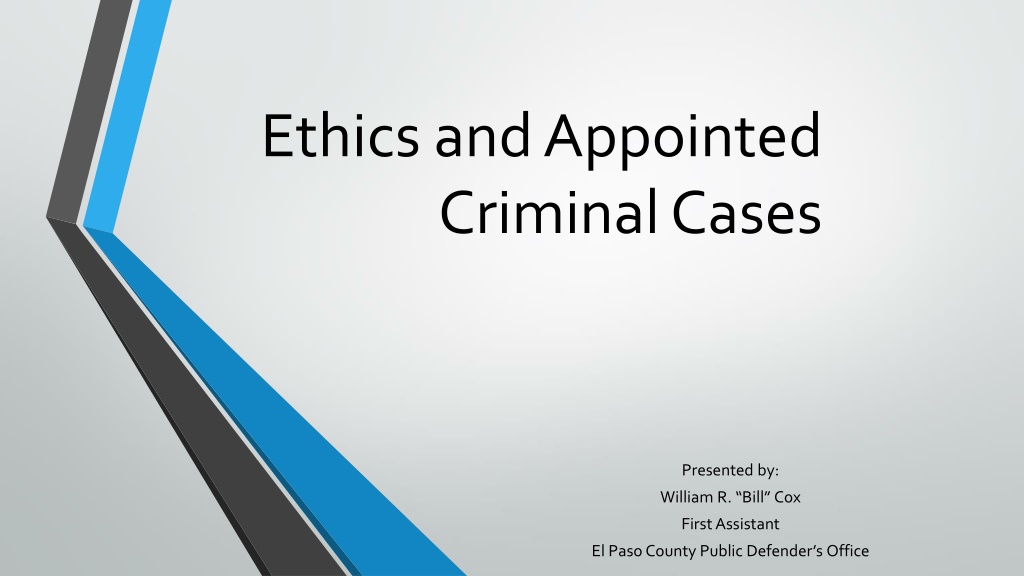




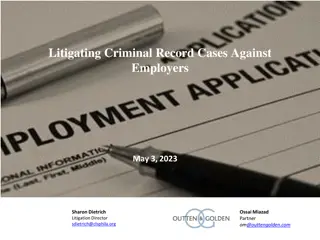
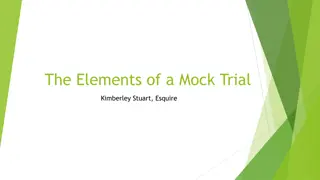

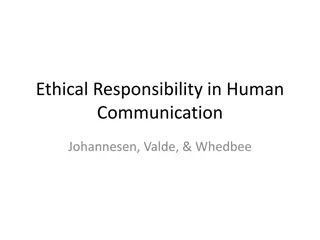
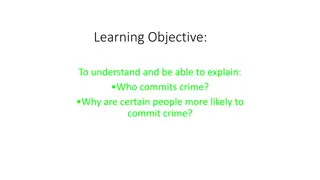
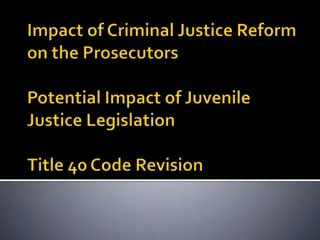
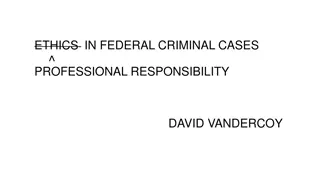





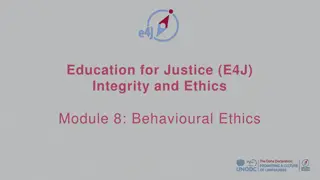


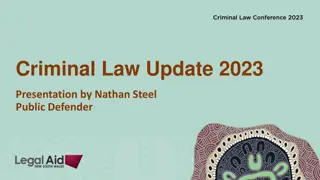
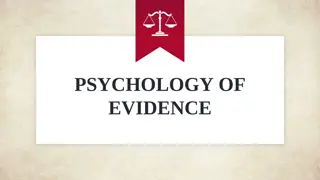
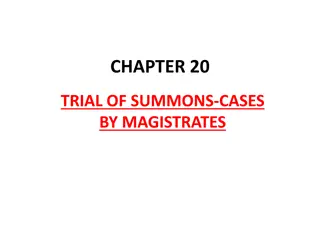


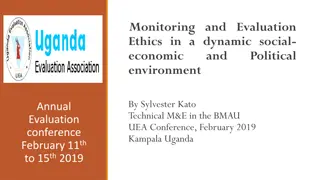
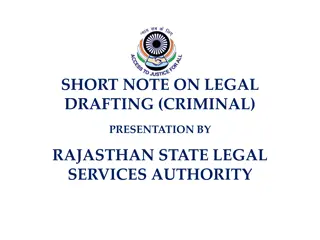

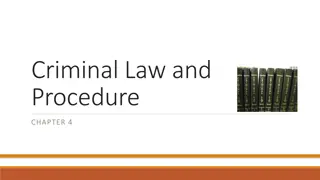



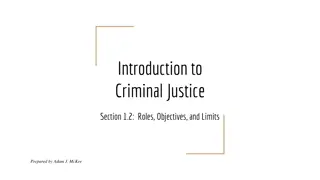
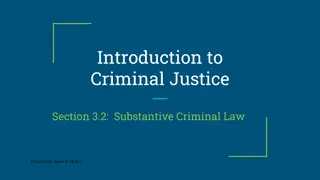
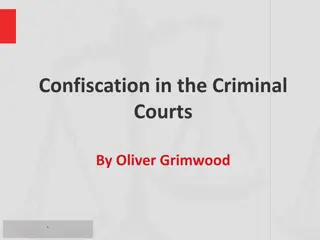

![Briefing on the Criminal Procedure Amendment Bill [B12-2021] to the Portfolio Committee on Justice and Correctional Services](/thumb/157093/briefing-on-the-criminal-procedure-amendment-bill-b12-2021-to-the-portfolio-committee-on-justice-and-correctional-services.jpg)
